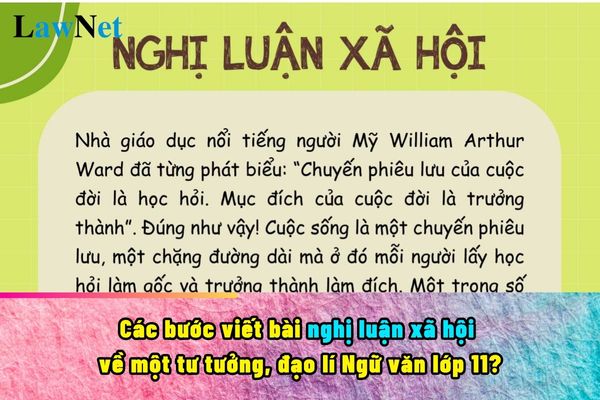Steps to write a social argumentative essay on an idea or moral for students in Vietnam
What are steps to write a social argumentative essay on an idea or moral for students in Vietnam?
Writing a social argumentative essay on an idea or principle is one of the topics that students learn in the lesson 1 of grade 11 Literature curriculum.
Therefore, students can refer to the following steps to write a social argumentative essay on an idea or principle in grade 11 Literature:
|
Steps to write a social argumentative essay on an idea or moral for students in Vietnam Step 1. Understand the Topic |
*Note: The information provided is for reference only./.

Steps to write a social argumentative essay on an idea or moral for students in Vietnam (Image from the Internet)
What are the study topics in the grade 11 Literature curriculum in Vietnam?
According to subsection 2 of Section 5 of the General Education Program for Literature issued with Circular 32/2018/TT-BGDDT, the study topics for grade 11 Literature include:
| Required Achievements | Content |
| Topic 11.1. RESEARCHING AND WRITING A REPORT ON A MEDIEVAL VIETNAMESE LITERARY ISSUE | |
| - Understand the requirements and methods for researching a medieval Vietnamese literary issue. | 1. Requirements and methods for researching a medieval Vietnamese literary issue |
| - Know how to write a research report. | 2. How to write a research report |
| - Utilize the knowledge from the topic to read, understand, and write about medieval Vietnamese literature. | 3. Some issues that can be researched about medieval Vietnamese literature |
| - Know how to present on a medieval Vietnamese literary issue. | 4. Requirements for presenting on a medieval Vietnamese literary issue |
| Topic 11.2. EXPLORING LANGUAGE IN MODERN SOCIAL LIFE | |
| - Understand that language is a social phenomenon and a part of culture. | 1. The social-cultural nature of language |
| - Identify and evaluate the new elements of language in contemporary social life. | 2. New elements of language: Positive and negative points |
| - Know how to apply new elements of contemporary language in communication. | 3. How to apply new elements of contemporary language in communication |
| Topic 11.3. READING, WRITING, AND INTRODUCING A LITERARY AUTHOR | |
| - Identify some prominent features of a great author's literary career and artistic style. | 1. Concept of artistic style and literary career of an author |
| - Know how to read a major literary author. | 2. Some requirements and methods for reading a literary author |
| - Know how to write an introduction about a literary author that has been read. | 3. How to write an introduction about a literary author |
| - Utilize the knowledge from the topic to read and write about other literary authors. | 4. Practice reading and writing about some major literary authors |
| - Know how to present about a literary author. | 5. Requirements for presenting about a literary author |
What are the elective subjects for high school students in Vietnam?
According to Section 3 of the General Education Program issued with Circular 32/2018/TT-BGDDT:
1. Basic Education Phase
1.1. Primary Level
a) Educational content
Compulsory subjects and educational activities: Vietnamese Language; Math; Morality; Foreign Language 1 (for grades 3, 4, 5); Natural and Social Sciences (for grades 1, 2, 3); History and Geography (for grades 4, 5); Science (for grades 4, 5); Informatics and Technology (for grades 3, 4, 5); Physical Education; Arts (Music, Fine Arts); Experiential Activities.
Elective subjects: Ethnic Minority Language, Foreign Language 1 (for grades 1, 2).
b) Educational time
Implement study two sessions per day, with no more than 7 lessons per day; each lesson is 35 minutes. Educational institutions that do not have sufficient conditions to organize two sessions per day should follow the educational plan provided by the Ministry of Education and Training.
...
1.2. Secondary Level
a) Educational content
Compulsory subjects and educational activities: Literature; Math; Foreign Language 1; Civic Education; History and Geography; Natural Sciences; Technology; Informatics; Physical Education; Arts (Music, Fine Arts); Experiential, Career-oriented Activities; Local Educational Content.
Elective subjects: Ethnic Minority Language, Foreign Language 2.
b) Educational time
...
2. Career-oriented Education Phase
2.1. Educational content
Compulsory subjects and educational activities: Literature; Math; Foreign Language 1; History; Physical Education; National Defense and Security Education; Experiential, Career-oriented Activities; Local Educational Content.
Elective subjects: Geography, Economics and Law Education, Physics, Chemistry, Biology, Technology, Informatics, Music, Fine Arts.
Students select 4 subjects from the elective subjects.
Elective subjects for high school students include 4 subjects: Geography, Economics and Law Education, Physics, Chemistry, Biology, Technology, Informatics, Music, Fine Arts.
>>> Download General Education Program issued with Circular 32/2018/TT-BGDDT.
(Note: Some content in this File is modified by Articles 1 and 2 of Circular 13/2022/TT-BGDDT)

